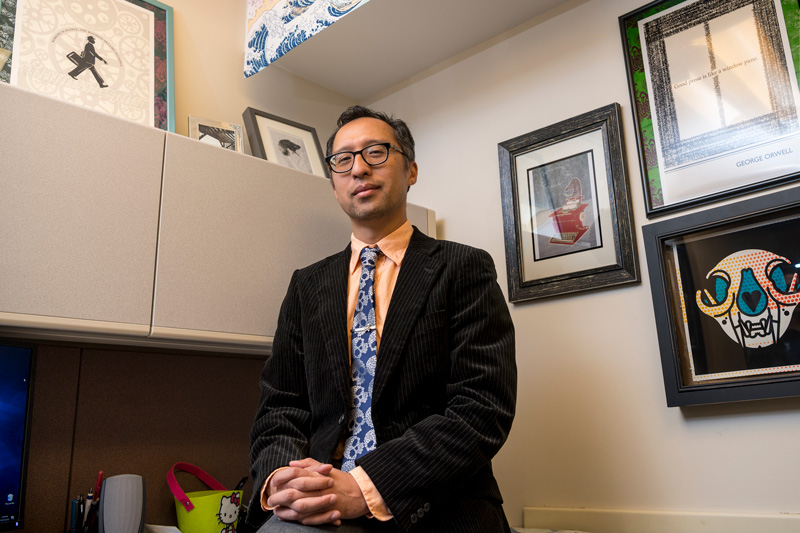


O. Henry Prize winner
Photo by Kathy F. Atkinson December 05, 2018
UD Prof. Viet Dinh tells story of ‘war, misery, monsters’
It was March 1, 1954, when a Japanese fishing boat — running low on supplies and ready to head home after one last day of hunting bigeye tuna in the Pacific — was caught in the fallout from a massive U.S. nuclear test at Bikini Atoll that rained radioactive dust onto the crew.
The account of that event and its tragic aftermath has been told by journalists and survivors, cited in efforts to limit nuclear weapons and even dramatized at the beginning of the 1954 movie Godzilla.
More recently, the incident inspired a short story by Viet Dinh, assistant professor of English at the University of Delaware, which has now won a 2018 O. Henry Prize, widely regarded as America’s most prestigious award for short fiction.
The story, “Lucky Dragon” (the name, in English, of the ill-fated fishing boat), is among 20 prize winners published in a new anthology.
For Dinh, the story was a way to explore a number of historical events and imaginary elements that had always fascinated him.
“The finished story hit on all my favorite things,” he said. “War, misery and monsters.”
Dinh, also the recipient of a previous O. Henry Prize, said he had been interested in writing about the Bikini Atoll test ever since he first learned about it. It was “such a formative event” for people in Japan and for those involved in global nuclear disarmament efforts.
“I took that interest and merged it with my love of horror movies,” Dinh said. “Then I pushed that a little farther.”
Without revealing too much about the resulting story, the fishermen in “Lucky Dragon” suffer more than radiation poisoning. They undergo hideous mutations — inspired somewhat by the Creature from the Black Lagoon as well as by the legend of grotesque Japanese mermaids — and are shunned by society.
For Dinh, the way his characters are treated by friends and family was inspired by another historical occurrence, in which former World War II prisoners of war often became social outcasts after returning home to Japan.
“Once I learned about how that had happened, I began incorporating it as a metaphor into this story,” he said.
Dinh, whose faculty office artwork includes posters and drawings depicting Godzilla and other monstrous creatures, says “Lucky Dragon” may become part of a collection of stories on which he’s working, tentatively titled “Mutant Monster Madman Mayhem.” He discussed how he came up with the concept in a recent interview with Ploughshares magazine, which first published “Lucky Dragon.”
“I make no secret of my love of horror films,” Dinh told the esteemed literary journal. “The good, the bad and the ugly.”
He’s also at work on a novel set just after World War I in rural Wisconsin. The setting may seem an odd departure from the more exotic locations in some of his previous work, which include India and Japan, but Dinh said it was a natural choice.
“It was a time and a place of great transformation in the United States, an upheaval in farming and in a lot of other areas of life,” he said. “That’s what I’m interested in, times when people are forced to confront change.”
He’s done research on the time and place, he said, in order to get the facts right and enable readers to immerse themselves in the world he’s exploring.
“I think most fiction writers are aware of the need to do a fair amount of research,” he said. “You always want things to ring true for the reader.”
More about the prize-winning story and Viet Dinh
Dinh taught fiction writing as an adjunct instructor at UD for several years and was named an assistant professor in 2016. He has received fellowships from the National Endowment for the Arts and the Delaware Division of the Arts.
He won an O. Henry Prize in 2008, and his first novel, After Disasters, was one of five finalists for the 2017 PEN/Faulkner Award, which honors the best work of fiction published by an American in a single calendar year.
“Lucky Dragon” also won the Alice Hoffman Prize from Ploughshares and has been published in the Best American Non-Required Reading 2017 anthology, part of the annual Best American series.
The O. Henry Prize Stories 2018 collection contains 20 prize-winning stories chosen from thousands published in literary magazines over the previous year. The winning stories come from a mix of established writers and emerging voices.
A brief excerpt of “Lucky Dragon” can be read here.
Contact Us
Have a UDaily story idea?
Contact us at ocm@udel.edu
Members of the press
Contact us at 302-831-NEWS or visit the Media Relations website

